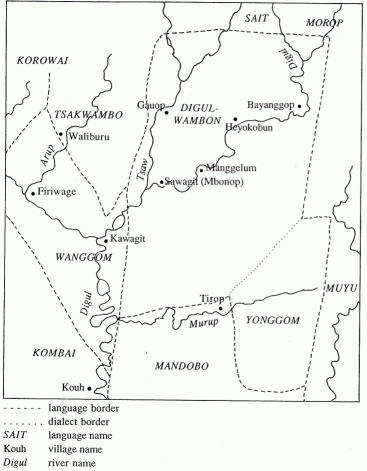Digul Wambon
Language Background
Digul Wambon, also known in the literature as North Wambon or Wambon, belongs to the Ndumut subfamily. It is spoken by about 3000 people in the Upper-Digul area of Southeast Irian Jaya. Digul Wambon, and in particular Digul Wambon as spoken in the Sawagit area (see map), was described by L.J. de Vries (1989 and 1992).

[geographical location of Ndumut languages]
Language Facts
Verbs are the most prominent word category in Digul Wambon. In their most extended finite form they consist of a verb root + mood marker + person-number marker + tense marker. The person-number marker marks the subject of the verb. The Digul Wambon person-number markers are:

As can be seen, there is no division between second and third person, between you and he/she/it.
An example of a conjugated Digul Wambon verb ‘to eat’ is:

The past tense marker at the end is –mbo, whereas –t is the realis mood marker. Less finite verb forms, in which tense is not marked or which consist of only a bare stem, also occur in Digul Wambon.
Verbalization of human experience
In Digul Wambon as well as in other Ndumut and Awyu languages, a verbalizer –mo or –ke can be added to a noun to make it into a verb. An interesting characteristic of Digul Wambon, as well as of the two other Ndumut languages, is that –mo or –ke can
be added to nouns that denote human experiences such as cold, anger, hunger and so forth. These so-called `experiencer verbs’ do not show agreement with the human experiencing the cold, hunger etc, but agree with the phenomenon (cold, hunger). These phenomena are perceived as being 3rd person singular forms (or non1-sg, meaning you/he/she/it). Thus the verb in the phrase ‘I am sleepy’ does not agree with ‘I’:

Similarly, the verb in the phrase `I am bleeding’ agrees with ‘blood’ rather than with ‘I’:

![]() Digul Wambon: A Pig Hunt [pdf]
Digul Wambon: A Pig Hunt [pdf]
